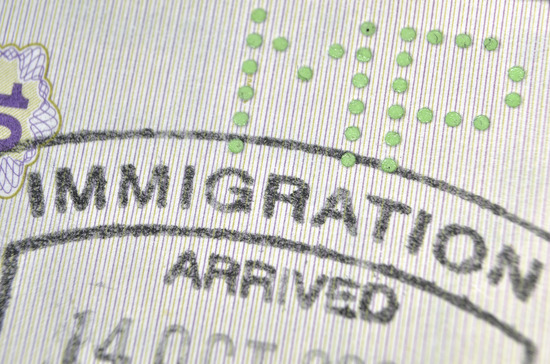
.
There are certain statements about immigrants that I hear on a regular basis.
One of these statements is:
“Immigrants should at least learn our language if they want to live here”
I have been an immigrant several times in my life and here are some reasons why saying this comment requires more compassion in your enlightened conversations.
Firstly – Learning a new language is not easy
Let me rephrase that… learning a new language as an adult is bloody difficult!
For most people it takes years and years of classes, practice and full immersion to feel a basic confidence in speaking a new language.
After 2 years learning Spanish, I know how to say certain things and I know the words for many things. If people speak s.l.o.w.l.y, I might understand the general idea of a conversation.
But, I would struggle to understand any conversation that goes beyond what I have heard before.
And guess what?
Most conversations quickly go beyond!
If you throw accents, sarcasm, fast talking, irony, sayings or new topics into the mix, I am screwed.
If I miss just one word or the meaning of one sentence I can get completely lost for the rest of the conversation. This is very disconcerting and makes me feel stupid.
Feeling stupid every day can knock your confidence.
You move to a country where you are out of your comfort zone. You don’t have your normal support network of friends and family and you can’t even ask people for directions when you are lost. It is likely you will lose some of your natural confidence. If you had it in the first place.
If you are shy normally, you get to be shy and feel stupid. If you are a perfectionist, you get to be a perfectionist who fails every day. If you are nervous about going to the dentist at home, you get to feel nervous about the dentist AND terrified that you won’t know what you are agreeing to. If you are used to being independent, you will suddenly become hyper-dependant.
When you are learning a new language:
- Your ability to understand sarcasm, irony and humour disappears.
- You lose the ability to be witty or let your personality shine.
- You can’t connect with people the same way you would in your own language.
- Some people will look at you with pity eyes. They also may talk loudly and act like you are stupid.
- You will have thousands of awkward moments understanding nothing of what is being said.
- There will be times when you say something bizarre/crazy/inappropriate and have no way to fix it.
Your personality will dictate your experience.
If you are young, extroverted, confident, friendly, like to drink, and/or are going to school or a job where you are forced to speak all day every day – learning a language can happen more quickly. Likewise if you are naturally good at languages. Or if you are single and good looking with suitors who are keen to help you learn.
If however you are older, shy, introverted, poor, are depressed, unwell and/or are isolated in your daily activities, learning a language in a new country can be a tough, seemingly impossible road. If you add to that social/racial/sexual/physical stigmas then the journey can be even harder still.
Look in your own neighbourhood. You will find a good number of people that struggle to feel connected and make friends. Add a language and/or culture barrier and suddenly you can see why some people can struggle for decades in their new country – many just stop believing in their ability to connect.
Some languages are easier to learn than others.
I have been struggling to learn Spanish which has the same structure and letters as English.
To go from English to Chinese or Arabic I imagine would probably take me up to a decade of active learning to feel confident and able to be myself… Potentially 5-10 years of active study, maybe more, and I would still sound like a foreigner.
I tried to learn Mandarin when I was a kid living in Hong Kong. It was so hard, I didn’t succeed in even getting the basics. There are no familiar markers between Mandarin and English. The switch from some languages to English is infinitely harder than other languages that use the alphabet.
I lived in Hong Kong on and off for the first 11 years of my life and managed to never learn Cantonese in that time. Was it deliberate? No… Did not being able to speak Cantonese handicap me there? Of course it did… Do I wish I could speak it? Yes!
Immigrants are not hiding away refusing to learn. They know that if they could speak your language it would make their lives immensely better, more enjoyable and give them and their families many more opportunities. Unfortunately it doesn’t make it any easier.
You will make friends with people you can speak to.

We spent two years in Latin America and we made friends who spoke English and friends who spoke Spanish. Lovely people! But the people who spoke English were the ones we could really get to know. I could discover so much about them in a few hours of conversation. These were the people we became closest to, they are mainly the people that we keep in touch with. It’s what happens. It is natural.
If you ever suggest someone is a problem for their lack of integration, or that people are deliberate in avoiding your culture, I dare you to live in China or Dubai and see who you end up being friends with.
Unfortunately this is a vicious cycle. Once you find a group of friends who speak your language and who share your culture, you feel more settled, but you end up being in a language bubble.
It’s human nature. English speakers do it all over the world.
It’s time for a little compassion.
The next time you hear people criticising the inability of immigrants to speak your language, spend a few moments visualising how difficult it must be to rely on someone every day to read your bills, answer your phone, or ask for help if something happens.
How insecure you must feel getting around or protecting your rights.
How uncomfortable life would be when people judge you before they even know you.
How disconnecting it must be to not be able to make small talk with the bus driver, or ask for a something in the pharmacy.
Consider that immigrating to a new country can be one of the hardest and most isolating things that people can go through in their lives when you can speak the language, and even more so when you can’t.
It’s time we stand with compassion, for the challenges that immigrants face when they can’t speak the local language. It takes many years and a lot of friendly, patient interaction from local people (like you) to help people learn and feel confident enough to practice their new language.
The best thing about raising the levels of compassion, is that with the amount of opportunities there are in the world – you might find one day that the immigrant is you.
- The Ultimate Barcelona Travel Guide – Discover Barcelona Like a Local! - October 17, 2017
- Travel Tips: How to find Vegetarian Restaurants - October 26, 2015
- Dealing With Car Trouble In the Middle of Nowhere… - September 8, 2015
This is a true representation of how it is to live in a foreign country. I lived in Turkey, Spain and Thailand for work and everything you have written was how it felt. Locals appreciate it if you are making an effort. It’s only bigots and people who have NOT lived o/s who make statements like the one in your title. Congratulations on awwoonderful article.
Thanks Pandy, yes people really do appreciate it if you make an effort. And it is so important to make an effort. I just feel people are quick to jump to an us and them type generalisation and don’t realise how tough it is to learn.
Here is the thing – immigrants SHOULD learn the language of a country they live in…for their own prosperity. They should learn the language because it will help them assimilate and live a more involved and prosperous life. The natives of any particular country are right to expect the immigrants to learn their language…or at least be seen attempting to. But they also SHOULD be compassionate and understand how difficult this is, especially for different types of people. And this is something you eloquently describe here.
Yes I believe that the majority of immigrants are keen to and expect to learn the new language and it is not until you are in a new country and feel like a fool that you get a reality check about how hard it could possibly be. I think the majority of people who don’t speak a language in a permanent new country are very disadvantaged and know it. They should learn and locals should be more compassionate about the time and complexity of what they are undertaking.
This is a great post. I’ve been on both sides: Struggling in a country with a foreign language and judging people who lived in NZ or Australia and didn’t speak English. Totally hypocritical! I wouldn’t have really thought about these points properly unless I had had the experience I did while in Italy. I’m terrible at different languages. Trying to speak any Italian was extremely hard for me and I can relate to a lot of the points you made. It turned me into a shy person, someone who felt that I wasn’t as smart as people who could pick up words easily, and my sense of humour was lost. A terrible feeling haha. You’re totally right about the fact that we need to be more compassionate. I probably would still feel differently about it had I not experienced the feeling of not knowing a language myself. I guess everyone should experience what it feels like before judging others. Also, a lot of immigrants move to have a better life, or escape to trauma. We should all be kinder.
Hey Christel, yes being kinder and more compassionate is the key! I suck at learning languages compared to John. But I am getting better, I just needed to turn that part of my brain on haha! In fact it was not until I tried to learn Spanish that I had more compassion for people learning English – especially the people whose language is sooo different.